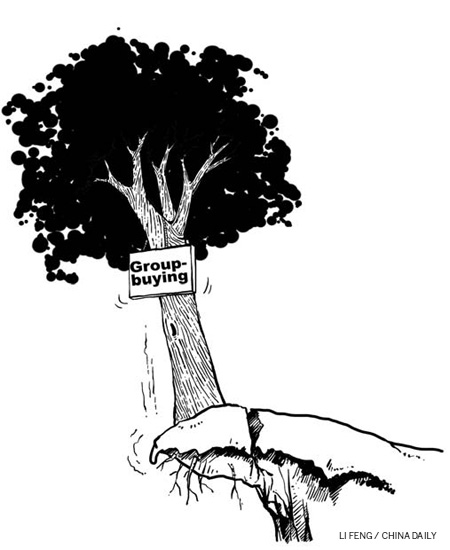Debate: Group-buying shops
Updated: 2011-10-17 07:59
(China Daily)
|
|||||||||
Three experts present three different views on group-buying websites.
Zhao Jingqiao
Regulation needed to ensure honesty
China has reached a critical stage where it's transforming into a consumer society. Fueling domestic demand and stimulating consumption have been the goal of the Chinese government since 2008, when the global economy entered a gloomy phase. This policy helped push the annual retail sales of social consumable goods to more than 10 trillion yuan ($1.572 trillion) in 2008, 12 trillion yuan in 2009 and 15 trillion yuan in 2010.
Transformation and upgrade of consumption are today important aspects of the economy, and online shopping has become popular among mainstream consumers, especially after group-buying raised netizens' consumption fever last year.
But even before online group-buying was introduced to China, service-based companies lacked effective online channels to promote their businesses. Food producers, medical and education services, and entertainment companies were highly localized and limited in size.
Large-scale group-buying lowered the threshold of e-commerce for individual consumers and substantially improved the situation for buyers and sellers both, accelerated the transformation of economic structure and helped promote domestic consumption.
As Chinese people's "needs" change from enough food and clothing to leading a comfortable life, people both in urban and rural areas are spending a lower proportion of their incomes on food and clothing and more on other needs such as education, medical care, housing, cars, recreation and entertainment. Although low prices play a key role in increasing people's group-buying urge, the corollary is that more services offered through group-buying portals help transform people's consumption pattern, meet their needs, and optimize their consumption structures.
This process has not only benefited consumers, but also the service providers, because group-buying offers them a freeway to expand and attract more customers. Besides, as more e-commerce enterprises join and thus expand the group-buying industry, they will act as catalysts for innovation, and help transform and upgrade consumption.
The booming e-commerce sector has been praised extensively, but equal attention should be paid to its defects and the problems it faces. Its greatest problem is honesty, or the lack of it. Since any company can enter the group-buying market, the sector has been flooded by websites providing commodities and services at wildly varying prices. There are too many group-buying websites and the market lacks the basic standards for ensuring the quality of goods and services.
The entire industry has been in a bubbling state. All websites, after a golden period of fast expansion and huge capital infusion, are facing fierce competition - which could lead to integration.
Almost all the group-buying portals offer food products or entertainment facilities only, with a few providing services related to education and medical care. This means there's still room for the market to diversify and expand.
Another problem is the increasing number of complaints filed by consumers, which is partly the result of competition between websites offering group-buying services. To get more business, some websites ignore the basic requirements from and restrictions on sellers, some of whom may be involved in foul play.
To tackle the last two problems and improve the situation, greater but healthier competition is needed in the market. And to deal with the problems of honesty (or the lack of it) and a bubbling industry, the government has to issue regulation and guidelines for consumers as well as business enterprises.
The author is a researcher at the Institute of Finance and Trade Economics, Chinese Academy of Social Sciences.
Hu Chen
Honesty is still the best party
The booming group-buying industry has helped increase the number of group-buying websites. In August alone, 168 new websites were started taking the total number in China to 5,039, according to figures from Tuan800.com, a group-buying navigation website.
The presence of a large number of newcomers in group-buying business doesn't mean the sector is profitable for all. Such is the imbalance in the sector that the number of portals with monthly transactions of 100 million yuan ($15.65m) and above has increased to seven while the number of small-scale websites forced to close shop is more than 300.
The situation may be stabilizing gradually with the number of group buyers in 40 major cities staying around 20 million since May, but it's far from being positive because the Tuan800 forum alone has received 8,723 complaints against the commodities consumers bought and services they availed of since July. The number of complaints in August reached a record 1,316, up 7.3 percent year-on-year.
Of course, all websites boast about their honesty and integrity. But they have to take concrete measures to guarantee quality products and services.
The group-buying websites have to be really honest. For that, they have to create a channel which consumers can use to file their complaints in details and even share their experiences with others.
Those running the forums make great efforts to classify the complaints against unfriendly service providers and substandard goods. But they have to take steps so that people can share their personal group-buying experiences, too, which will help them get the right kinds of goods and better services.
The lack of logistics in group-buying websites was noticed during the consumers' peak season of Spring Festival earlier this year. Yet not much has been done to fix the loopholes and straighten things. For example, the huge discounts offered during Spring Festival raised the demands for many goods and resulted in short supply of many commodities.
Another problem that seems to be rampant is the so-called "no-charge tours" and "fee-less tours" provided by some group-buying websites. In fact, people who wanted to avail of such services didn't get the right response. Instead, they were led by their guides to countless stores one after another and coaxed into spending money to buy unnecessary goods.
Tickets to movies are another big attraction for group buyers. Yet people have to be on guard against "super-low" ticket prices to see if they have any hidden set of restrictions such as specific time and/or specific movies. In a word, there is still room for improvement. Many group-buying websites have started collecting fees from sellers as guarantee money against possible complaints. They are trying other means, too, such as allowing consumers to share their experiences to get proper feedback.
But fundamentally, sellers, group-buying websites and navigation portals have to base their trade on honesty and integrity and make greater joint efforts on this front. To help them serve consumers better, the government should strengthen monitoring and promulgate sound regulatory rules as soon as possible.
The author is founder of Tuan800.com. This article is based on excerpts from his interview with China Daily's He Bolin.
Feng Zhiqiang
Understanding people's needs vital
Group-buying has become part of many people's routine because it offers great benefits, especially attractive discounts on goods and services.
The industry is booming because group-buying websites are attracting more customers for their goods and services by offering increasingly large discounts and consumers are buying more to "save money".
But despite the positive developments at both ends of the industry chain, one cannot help but ask: Where is the margin of profit for group-buying websites? Their way of raising funds and keeping their operations running is also worth taking a look at.
Most of the group-buying portals survive on three factors. First, they offer very low prices to buyers and then increase them slightly as the demand rises - or keep the original prices and get a rake-off once the sales reach a certain volume.
Second, some times group-buying websites organize off-line promotional activities, especially for high-priced and luxury goods like houses and cars. Since the amounts involved are large, the organizers usually get intermediary fees from the original sellers.
Third, the group-buying portals charge fees from consumers to make profits.
The three kinds of fund raising are essential for the survival of group-buying websites. To emerge victorious from the increasingly intensified group-buying competition and the battle for survival, the websites need to expand, increase and improve services.
As a matter of practice, group-buying websites give priority to promotions and advertisements, for many enterprises target regular group-buyers too. That's why despite advertisers' special liking for group-buying websites, the industry still has a great scope for integration and service upgrade.
In other words, the future of group-buying is still prospective, though the huge number of websites has intensified the competition which eventually leads to industrial integration and diversification of goods and services.
Group-buying was introduced to China last year, and the industry has been going through chaos since then, though some of the portals are making good money. But in the near future, when markets mature and the government finally issues the "pending" regulations, few will survive the competition.
Some may say that the group-buying fever was a nine-day wonder, after which people returned to rational consumption leading to a winter for e-commerce. But such arguments are groundless, because consumers, both in times of economic depression as well as prosperity, never refuse good but cheap services.
But to be frank, the industry itself is experiencing a cold winter and most websites are doomed to shut down, because after capital drains, the market needs healthy development with scaled-up players with capabilities to operate on their own and provide better and convenient commodities and services.
And the key to success for group-buying will depend on mobile terminals. Along with the fast development and popularization of 3G wireless network, websites operators need to make greater efforts to cheer increasingly socialized consuming groups.
Besides, it's very important for group-buying services to understand people's real needs and sell (or distribute) goods and services that they need the most.
The author is a Beijing-based market observer and founder of a travel website.

(China Daily 10/17/2011 page9)









